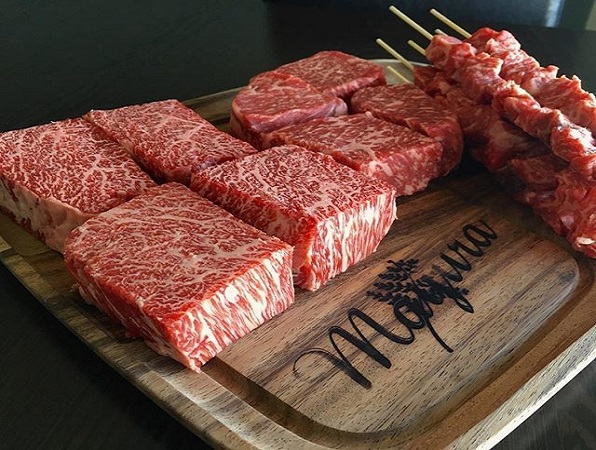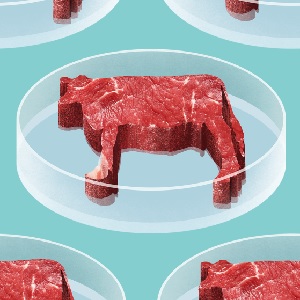It was inevitable, I guess. When one advance is made in science or technology, there’s an equal and opposite setback somewhere else in the industry that’s affected. So it is in the Meat sector, where traditional producers are demanding that lab-grown meat products be labeled ‘Not Meat’…
 One way American ranchers could adapt to a ‘slaughterless’ future is to evolve their business model toward the example provided by Japanese specialty growers
One way American ranchers could adapt to a ‘slaughterless’ future is to evolve their business model toward the example provided by Japanese specialty growers
who produce Wagyu-style ’boutique’ beef.
The pioneers of lab-grown meat proteins recently announced they’ll be ready to mass-produce their products by 2020 or 2021. That apparently got the traditional Chicken and Beef producers thinking about where that leaves them. Where it leaves them. potentially, is out in the cold. Out of business. How soon might we expect the new, humane, cultured Meat products to take over the market? I don’t think it’ll be all that soon. And, when the first commercial cultured Meats hit the retail market, I bet they’ll be pricey – not something we’ll all line up for every week at the supermarket.
Nevertheless, U.S. Cattlemen’s Association – the national Beef Producers’ special interest group – has filed a fifteen-page petition with the U.S. Department of Agriculture (USDA) demanding that, when cultured Meat products do hit the market, they be labelled ‘Not Meat’, to differentiate them from products that come from animals raised on the farm and slaughtered in the traditional way.
The Cattlemen’s Association writes:
“[The government] should require that any product labeled as ‘beef’ come from cattle that have been born, raised, and harvested in the traditional manner, rather than coming from alternative sources such as a synthetic product from plant, insects, or other non-animal components and any product grown in labs from animal cells.”
That’s a pretty wide swath…
The Cattlemen’s definition of ‘Not Meat’ also takes in not only cultured Meat products but other ‘alternative’ sources. And, as a class, that’s a fast-growning niche. I guess the cowboys are getting nervous about the sustainability of their business model because of all the media coverage ‘alternative’ protein sources have been getting the past year or so. But I also think their knee-jerk reaction is a little over the top, to say the least.
Not to worry…
As I said at the outset of this post, I don’t think cultured or ‘alternative’ protein products will be much more than novelties on the big, wide retail market for some time to come. And when the stuff does come on the market in a few years, I don’t think there will be a lot of it to go around (at least at first), nor do I think it will be priced competitively with ‘traditionally grown’ meat products.
As for the overall market, OI think it will take at least a generation, maybe two, for cultured meat products to capture the preferences of a majority of Meat eaters. It’s just too foreign a concept to those of my generation and my kids’ generation to become an everyday thing for us.
And won’t it throw into a tizzy the vegetarians and vegan who base their abstention from traditional meat products on the fact that something living has to die to to provide them! But that’s another post…
So… I don’t think the Cattlemen, or the Chickenmen or the Lambmen or the Fishmen have anything serious to worry about right now, this minute.
What the traditional ranchers should be doing…
…Is looking at ways to modernize their operations, directions in which they can take their business model so that they still have a place in a ‘slaughterless’ future.
Maybe they should be looking at marketing their product as a boutique treat, the way Wagyu and other styles of Beef are already marketed.
Maybe they should be playing up the traditional aspect of their products to capture the market segment that wants to see its ‘Beef’ on the bone, in traditional cuts and presentations. After all, we don’t all want Burgers all the time. I can’t see a day when chefs and diners won’t want to make and enjoy conventional chops and steaks and roasts.
And… Traditional ranchers should be looking at other uses for their vast, rich lands. If a far-future ‘Meat’ industry wants Soy instead of sows, they should be preparing to feed that need. That, of course, would mean putting away their proud traditions and joining the ‘dirt farmers’, but they would at least still be making a good living and keeping their land in production!
~ Maggie J.

